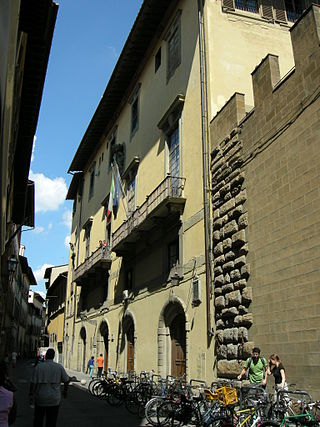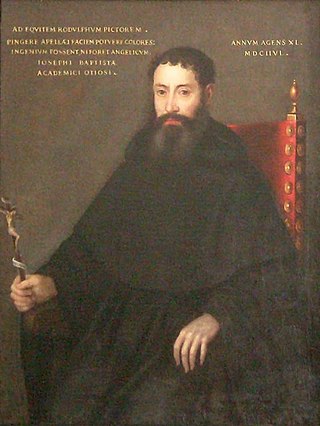
Angelo Maria Bandini was an Italian author and librarian born in Florence.
Events from the year 1714 in literature.

Francesco Maria Sforza Pallavicino or Pallavicini, was an Italian cardinal, philosopher, theologian, literary theorist, and church historian.

Leopoldo de' Medici was an Italian cardinal, scholar, patron of the arts and Governor of Siena. He was the brother of Ferdinando II de' Medici, Grand Duke of Tuscany.

Filippo Buonarroti, the great-grandnephew of Michelangelo Buonarroti, was an Italian official at the court of Cosimo III, Grand Duke of Tuscany and an antiquarian, whose Etruscan studies, among the earliest in that field, inspired Antonio Francesco Gori. The Etruscan art and antiquities in the family palazzo-museum of Florence, Casa Buonarroti, are his contribution to the artistic-intellectual memorial to the Buonarroti.

The National Central Library of Florence is a public national library in Florence, the largest in Italy and one of the most important in Europe, one of the two central libraries of Italy, along with the Biblioteca Nazionale Centrale di Roma.
Henry of Settimello was a late 12th-century Italian poet. Arrigo is considered Italy's leading Latin poet of what is called the twelfth-century Renaissance. He was the author of De diversitate fortunæ et philosophiæ consolatione, a Latin poem in elegiac couplets. His Latin nickname is linked with a story that he could not afford paper and was forced to write his poems on old parchment.

Paolo Segneri was an Italian Jesuit preacher, missionary, and ascetical writer.

Anselmo Banduri was a Dalmatian Italian, Benedictine scholar, archaeologist and numismatologist from the Republic of Ragusa.

Giovanni Lami was an Italian jurist, church historian, and antiquarian.

The Biblioteca Riccardiana is an Italian public library under the aegis of the Ministry of Culture, located inside the Palazzo Medici Riccardi at 10 Via de’ Ginori in Florence, in the neighborhood comprising the Mercato Centrale and the Basilica di San Lorenzo. Its main feature is preserving books collected by members of the Riccardi family and making them available in the very same rooms that were originally dedicated to that purpose. So, still today the library boasts the magnificent bookshelves, neatly carved and gilded, that create the atmosphere of a late-seventeenth-century patrician library, whose main features have all been kept intact.

The Scarabelli library is the public library in the city of Caltanissetta in the centre of the island of Sicily, Italy. In 1862, the library was established by Antonio Mordini in the premises of the former Jesuit convent.

The Casino Mediceo di San Marco is a late-Renaissance or Mannerist style palace located on Via Cavour number 57 and via San Gallo in Florence, region of Tuscany, Italy.

Francesco Marucelli was an Italian abbot, bibliographer and bibliophile. His book collections form the core of the Biblioteca Marucelliana in Florence.

Emmanuele Antonio Cicogna was an Italian writer, scholar, and book collector. He left his huge collection of books to the city of Venice and it now forms part of the Museo Correr.

Bartolomeo Intieri was an Italian agronomist.

Marcello Papiniano Cusani was an Italian archbishop, professor of both civil law and canon law as well as founder and rector of the University of Altamura.

Angelico Aprosio was an Italian Augustine monk, scholar, and bibliophile.

Federigo Nomi was an Italian poet and translator.

Francesco Rondinelli was a Florentine scholar and academic of the Seicento.


















